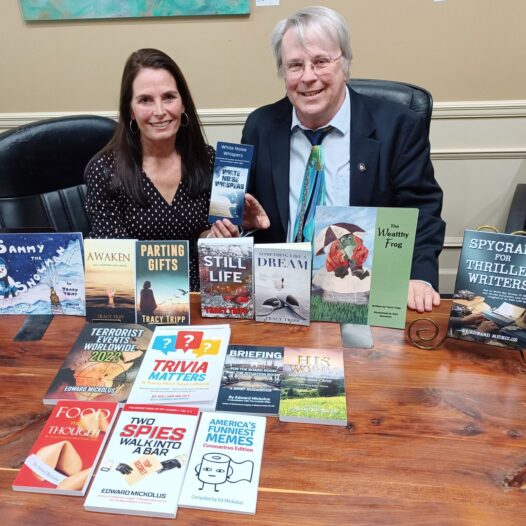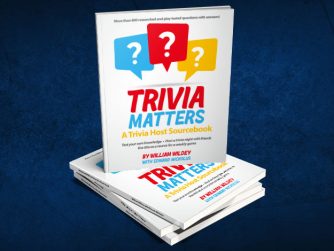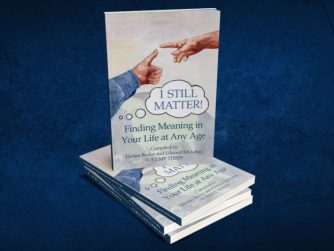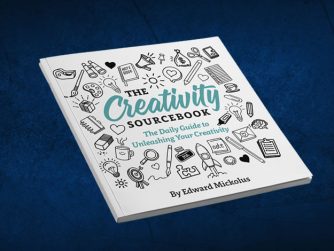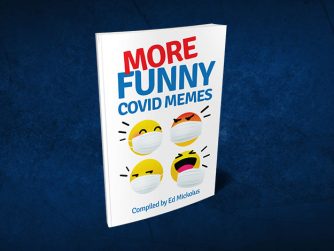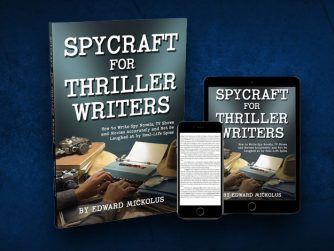By Shaun Ryan in the Ponte Vedra Recorder
As he frantically hunts down a serial killer on the loose in Jacksonville, Detective Jim Castile receives clues from a strange source: voices coming over his walkie-talkie – voices of the killer’s victims. But that’s not the only thing that sets this case apart for Castile. Because everything is about to get personal.
The final voice he hears is that of his wife.
“White Noise Whispers,” a crime thriller co-written by local authors Tracy Tripp (writing as T.S. Tripp) and Edward Mickolus, actually tells two stories: the detective’s mission to stop the murders and the events that made the killer what he is.
The novel’s antagonist is a psychiatric patient, a former U.S. Marine who fell in love with an embedded journalist during his service in the Iraq War. The horrific acts he’s forced to commit in the line of duty precipitate his decline, and the journalist becomes his first victim.
It’s an unusual premise that brings together elements of traditional crime fiction with a deep character study and questions about the impact of battle on those who must engage in it.
And, like all good reads, it started with an idea.
Getting it right
Mickolus, the author of 50 books (and counting), was at a book festival three years ago when he first met Tripp, who approached him hoping that the prolific writer and the former CIA analyst could help her with the verisimilitude of her latest romantic suspense novel, “Something Like a Dream.”
Mickolus read the book and was impressed.
“She’s the best writer I’ve ever read,” he said.
Mickolus suggested they collaborate on something and gave Tripp a list of ideas he’d been saving up. She liked one about an investigator who solves crimes by hearing voices over a walkie-talkie.
Over the next two years, they developed the story and its characters. But it wasn’t as simple as spinning a yarn for their readers. Both authors were committed to getting their facts right, and that meant research. A lot of it.
“I had to learn about the Iraqi people,” said Tripp. “I had to learn about religions and really delve into it.”
Interviewing experts was an essential part of the research.
“We had great resources to help us,” Tripp said.
For background on the Marines, Tripp turned to a relative who was a veteran. Mickolus, meanwhile, found a former military officer who had served during the fighting in Fallujah, as well as a Gulf War vet. A forest ranger described techniques that might be used to locate a body dumped in the woods. And, to make their investigators sound authentic, the authors researched “cop talk.”
“How people in LAPD speak is just different than NYPD and different from JSO,” said Mickolus. “So, I interviewed various police officers and sheriffs. We are aiming for accuracy throughout this.”
In fact, they even researched the type of walkie-talkie their protagonist uses.
But facts are not all that must be correct. Readers will only become invested in the characters if they ring true. Here, the author’s sensitivities come into play.
Within the writer, Tripp said, there are a million different people. She must put herself inside the mind of the character, see through the character’s eyes in a creative process that might be compared to method acting. In this way, the writer can believably render the thoughts and observations of, say, a priest, a detective, even a serial killer.
“Tracy has a wonderful ability to sit in each of the characters’ heads so that you can really empathize with what’s going on in there,” Mickolus said.
“You have to find that little seed inside of you and then research it, let it go and really kind of sympathize with all your characters to make them really well-rounded,” Tripp said.
This safeguards the characters from becoming two dimensional. It’s especially important in the case of the antagonist so that readers can appreciate the forces that made him what he is. As with the best characters in a Hitchcock film, the readers are challenged by a villain they are compelled to understand.
“You really get into his head,” Tripp said. “And you see the whole process of where it started to go wrong.”
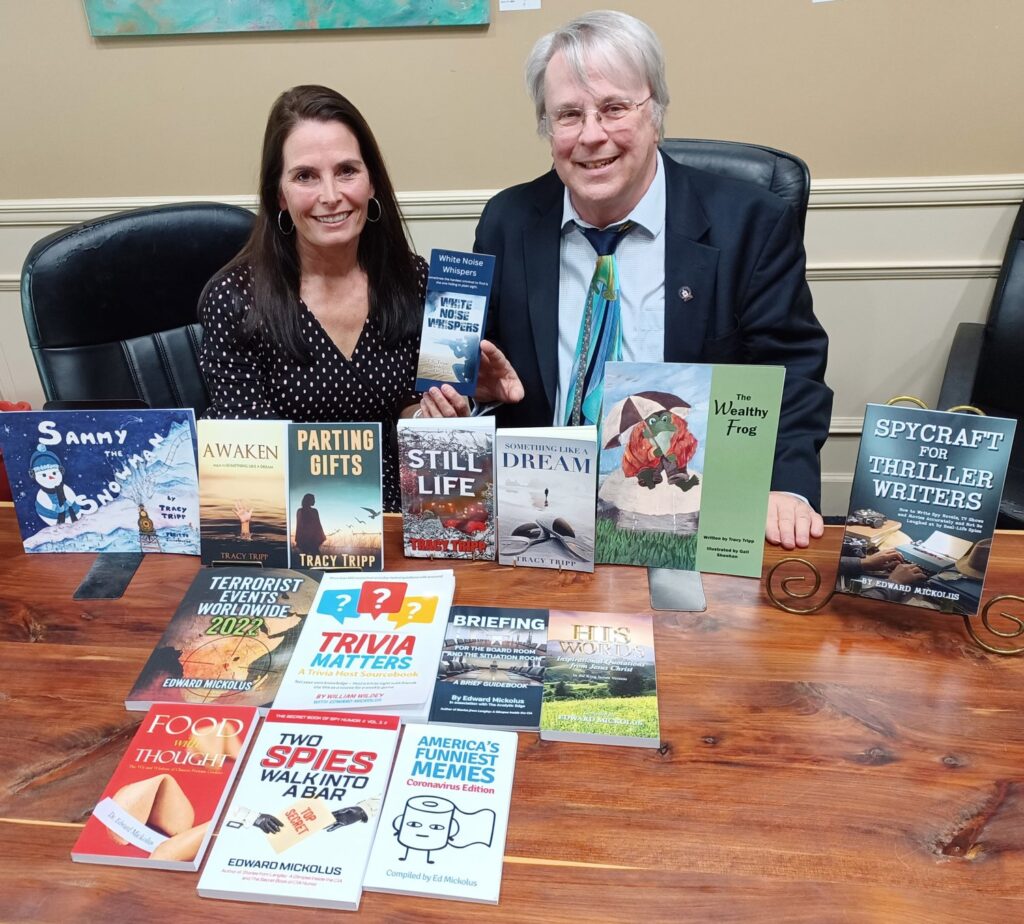
At The Keyboard
Where do you get your ideas? A question every teller of tales has heard since the campfire stories of our pre-historic ancestors.
A lot of times, the writer will admit they don’t really know. But in many cases, they get their best ideas when doing some activity that doesn’t require attention by the right side of the brain.
“A lot of people tell me, ‘When I’m showering, I get my great ideas,” said Mickolus, who lives in Nocatee and occasionally teaches courses in creativity at the University of North Florida. “So, clever people are a clean people.”
Most of Mickolus’ books are nonfiction and fall into several categories: terrorism, intelligence, inspiration, humor, how to, trivia and advice for writers.
He generates his works concurrently so that there’s always something new on the market. Currently, he’s working with about 20 other CIA retirees to produce a novel to which each will contribute a chapter, a process he calls “a blast.”
With a Ph.D from Yale, Mickolus served in analytical, operational, management and staff positions at CIA for 33 years. Read more about him and his writing at edwardmickolus.com.
Tripp, of St. Johns, writes about “broken spirits” and has authored two romantic suspense novels, “Something Like a Dream” and “Awaken,” two novels of women’s fiction, “Parting Gifts” and “Still Life,” and two books of children’s fiction, “The Wealthy Frog” and “Sammy the Snowman.”
A self-proclaimed “observant introvert,” she’s always watching the dynamics of the world around her, a key factor in her writing and something that may have its roots in her childhood. She said her mother insists that she didn’t speak until she was 4 years old.
“I think as a writer, you should be observing,” she said. “Just the little things that pass people by. That helps you get into people’s heads and create the character, because you’re really just seeing different nuances and kind of guessing at who they are inside.”
Learn more about Tripp and her works at tracytripp.com.
“White Noise Whispers,” published by The Wild Rose Press, is available on Amazon.com and other places.

